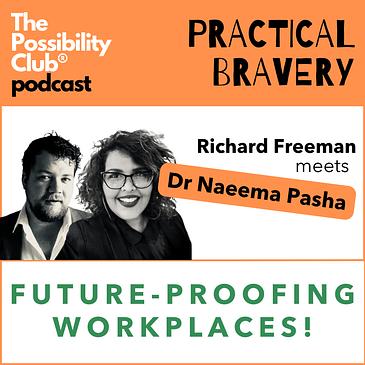The Possibility Club podcast: Practical Bravery - FUTURE-PROOFING WORKPLACES!
In this episode, we return to the nuanced interplay between machine learning and human ingenuity. Can machines complement our creativity, or will they eclipse the essence of human touch in professions once thought impermeable to automation? As we navigate the digital era's complexities, questions of equity, diversity, and the human experience within the technological landscape become increasingly pressing. How do we harness AI to foster inclusivity and bridge divides, rather than widen them? Amidst the relentless pace of innovation, where does the individual find their footing, and how do we cultivate resilience and adaptability in a workforce facing unprecedented shifts? Our guest this week is work futures and technology expert, Dr Naeema Pasha.
---
Dr Naeema Pasha via LinkedIn
https://www.linkedin.com/in/dr-naeema-pasha-9b23b66/?originalSubdomain=uk
Dr Naeema Pasha on Twitter/X
https://twitter.com/naeema_pasha?lang=en
Futureproof Your Career — Dr Naeema’s ebook
co-written with Shaheena Janjuha-Jivraj via Amazon
https://www.amazon.co.uk/Futureproof-Your-Career-Succeed-Changing-ebook/dp/B091Y37WZC/
“There was just a report done recently at Henley about bosses wanting people back in the workplace, having what’s called a ‘proximity bias’, I will trust you more if I can see you visibly.”
Henley Business School
“Research shows there are people wanting this identity of us just not being workers, that we are also doing other things, we have families, or commitments, or hobbies, or anything. People expect flexibility.”
“People are expecting to have time to take children to school, or wellbeing. All these things seem to be much more in the psyche of workers.”
“Looking at the research I did on race equity, and other people in Henley have done further study on this, is that people are biased. And what we found with the A.I. is that it could be less biased in coaching.”
“When we talk about skilling, the research I did — and this was my doctorate — is that, rather than the skills of coding and STEM and this kind of thing, what is more important is for us to start understanding ambiguity, work through uncertainty, and therefore what skills are important are how to be focused, how to go through these complexities that we have, and work out where we are and how we progress.”
Work of Work Institute
https://www.henley.ac.uk/world-of-work
Henley Business Schools’ Leading Edge podcast with Naeema
https://www.henley.ac.uk/leading-edge/future-of-work-how-to-channel-the-spirit-of-gen-z
On job hunting —
“The job hunting experience has been interesting. Having worked in graduate recruitment, where thousands of people go through processes, now myself being part of a pool.”
“The most important thing is to humanise the process.”
“The ‘ghosting’ experience is strange. A handful of big organisations are processing everyone. Your data is kept and it’s pushed through this funnel, but then you get ghosted at the end. Automated systems should allow for a rejection stage as well.”
“There’s enough intellect in organisations to be able to think, how do we manage this process? Because it’s a decent thing to do and actually it’s good for the recruitment brand as well.”
"It still feels like ‘you should be grateful’ and we’ll put you through these ridiculous amount of tests and interviews.”
“This year has been a real experience of hearing the term ‘we’re about the hustle’, ‘we’re about the hustle culture’, hearing that quite a lot with employers.”
‘Equality alone won’t help you win the war on talent’
article by Dr Naeema Pasha in The HR World
https://www.thehrworld.co.uk/culture-clash/equality-alone-wont-help-win-war-talent/
Wired article on Grindr’s demand that workers return to the office
“Being able to collaborate was really important, and being able to collaborate in a way that allowed for diversity to come into place.”
“We still want to feel a sense that people care for us. And we can also do the same for other people. And that was the same in physical places, as well as online.”
“Caring has come up so often in organisations that people want to know how they can make it more explicit, how they can show that a lot more. Not just to care for others and our teams, but ourselves as well.”
“We might even go to shops where it’ll say ’no A.I. used here’ because we don’t want our retinas scanned.”
“The rate of change is fast. We have to work with young people to understand you are valuable, you are brilliant, you’ve got capability, how can we understand your strengths?”
“I think equity and diversity is going to be more important and A.I. will probably enable that to work better.”
------
This episode was recorded in November 2023
Interviewer: Richard Freeman for always possible
Editor: CJ Thorpe-Tracey for Lo Fi Arts
For more visit www.alwayspossible.co.uk








